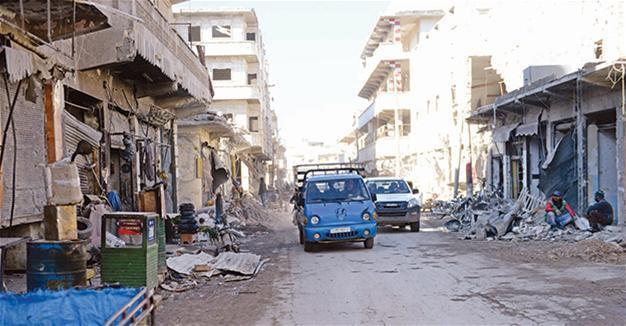Turkey not convinced with Russian denial for military base in Afrin
Sevil Erkuş - ANKARA

AA photo
Russia’s Defense Ministry has denied reports that Moscow is building a military base in Afrin, but Ankara is not convinced by Russia’s comments on the matter, even as it has shied away from publicly responding to Moscow over its developing alliance with Syrian Kurds.Russia did not inform Turkey about such a military deployment, a Turkish official told the Hürriyet Daily News. Turkish intelligence found out that a Russian convoy of four vehicles arrived in Afrin through the Menagh region to the south of Azez, according to the official.
Russian officials denied reports on March 20 that it was constructing a base in the area held by the People’s Protection Units (YPG), saying it was constructing a center to foster reconciliation in Syria.
But the current peace monitoring centers, which were established at the Hmeimim air base in Syria for Russia and in Ankara for Turkey as part of a Dec. 30, 2016, cease-fire deal, are capable of monitoring the situation on the ground, another Turkish official told the Hürriyet Daily News, underlining that there were currently no clashes in Afrin requiring a monitoring mission.
Turkey has not yet established a cease-fire monitoring center in Syria due to security concerns, the official said.
The Russian deployment might be aimed at averting any clashes between Syrian opposition groups and the YPG’s political wing, the Democratic Union Party (PYD), according to assessments in Ankara.
Turkey earlier expressed its unease to Moscow at the Russian military’s cooperation with the YPG, the official said.
YPG: Russia setting up military base
Russia is setting up a military base in northwestern Syria in an agreement with the Syrian Kurdish YPG and will begin training YPG fighters as part of the fight against terrorism, the militia’s spokesman said March 20.
Russian forces are present in the western-most Kurdish canton of Afrin “as a result of an agreement between our forces and the Russian army,” YPG spokesman Redur Xelil announced in a published statement.
“The agreement was based on the framework of cooperation in the fight against terrorism and on the military training of our fighters by the Russian army. We have direct relations with Russia,” Xelil said.
In the meantime, the Russian Defense Ministry denied reports that Moscow was building a military base in Afrin and that the agreement had included the training of combatants from Kurdish formations.
“There are no plans to deploy new [Syria] military bases on the territory of the Syrian Arab Republic,” the statement said March 20.
“According to the Russian-Turkish agreements dated Dec. 30, 2016, the units of the Russian Center for Reconciliation of the Opposing Sides on the territory of Syria conduct 24-hour monitoring of the cease-fire. In order to prevent a violation of the cease-fire regime, a section of the Russian Center for Reconciliation of the Opposing Sides has been deployed in the contact area between detachment of the Kurdish militia and formations of the Free Syrian Army controlled by the Turkish party [near Afrin in Aleppo province],” the ministry said.
Russia has been improving its relations with the YPG despite the fact that Turkey is against any sort of collaboration with the Syrian Kurds as it sees the group as an offshoot of the outlawed Kurdistan Workers’ Party (PKK).
Turkey opposes any form of participation by the PYD in the peace talks for Syrian crisis, but Moscow has expressed the need for the Syrian Kurds to participate in the Geneva and Astana talks. In a previous meeting in Astana, Russia proposed a Syrian constitution draft which envisages cultural autonomy for the Syrian Kurds.
Moreover, in early March, the Syrian Democratic Forces (SDF), a loose coalition consisting primarily of the YPG and an assortment of Sunni Arab, Turkmen, Yazidi and Assyrian ethnic militias, reached a deal with Russia to hand over some villages to the Syrian government to the west of Manbij in a bid to deter Turkey from attacking the city.
The YPG and its political affiliate, the PYD, aim to deepen their autonomy through the establishment of a federal government in northern Syria.
Afrin is of one of three cantons, along with Kobane and Cizre, which Syrian Kurds want to link, but their goal was thwarted last summer when Turkey launched the Euphrates Shield Operation, taking control of Jarablus and al-Bab.
















